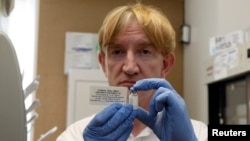Ebola continues to claim lives despite desperate efforts to stop the spread of the disease. The latest victim is Dr. Martin Salia of Sierra Leone, who is the second person to die in the United States.
Worldwide, more than 5,000 people have reportedly died, the majority in the West African countries of Liberia, Sierra Leon and Guinea.
As the scramble to curb the pandemic ensues, solutions are coming from unlikely places. One in particular, is tobacco.
Notorious for its cancer-causing properties, the nicotine-rich product could soon prove to be effective in treating Ebola. A biopharmaceutical company in Guelph, Canada, called PlantForm, is currently testing a trial drug with the hopes of having it on the market in three to four years.
The company’s president and CEO, Don Stewart, said these are exciting times for the tobacco industry, long seen as a threat to good health.
“The possibility of creating, at very low cost, drugs for Ebola, is an exciting opportunity for us all.”
TOBACCO FREE
Given the negative health effects of tobacco, Stewart was quick to explain that the drug itself is tobacco-free, and that the tobacco serves only as a bio-reactor.
“When we produce a drug, we are actually purifying away all the components of the drugs, of the whole tobacco system, to make a purified drug. So we have to show, with a lot of testing, the product we have has no residual containing materials from tobacco.”
Stewart further explained that the product is still in the experimental phases, and has been evaluated in Canada and the United States, by the U.S. military.
“The drugs that are currently being used were developed in Canada and the U.S. and have been tested in a number of studies in the U.S. in animal models, and now are beginning to be studied in patients in some of the African countries where the current outbreak is occurring.”
ZIMBABWE’S ROLE
According to the World Health Organization, the current outbreak of Ebola, which was first discovered in 1976, is the largest and most complex.
Stewart says his company’s product is targeting just one of the various strains of Ebola that have been identified.
Zimbabwe, which is a heavy producer and exporter of tobacco, producing more than 200 million kilograms worth more than $700 million, is hoping to be a part of the development of the drug, that use tobacco.
Stewart, however, said the cost of producing the drug is high.
“One of the unfortunate things is that the production of the tobacco part is very cheap, so that can be done with knowledge, but the actual purification of the molecules from which they can be injected into people is quite complex. And so in some situation, what people do is they will grow the tobacco in one facility and then you can move it to an existing drug production facility, in another location and that reduces the cost.”





